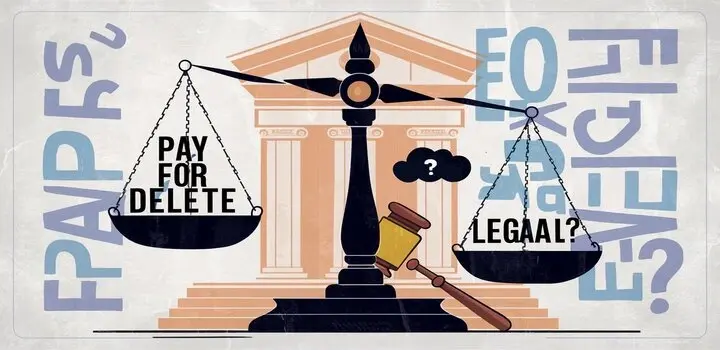-
Posted on: 13 Jul 2024

-
Many people believe that negative information on their credit report automatically vanishes after seven years, resulting in a "clean slate." While this is partly true, the reality is more nuanced. Understanding the laws governing credit reporting and the specific timelines involved is crucial for effectively managing your credit health. This article will delve into the intricacies of credit reporting durations, explore exceptions to the "7-year rule," and provide actionable steps to improve your credit score.
Understanding Credit Reporting and Its Importance
Your credit report is a comprehensive record of your credit history, detailing your borrowing and repayment behaviors. It's compiled by credit bureaus like Equifax, Experian, and TransUnion based on information provided by lenders, creditors, and other financial institutions.
A strong credit report is essential for various aspects of your financial life, including:
- Securing Loans: Lenders use your credit report to assess your creditworthiness when you apply for loans, mortgages, and credit cards. A good credit score increases your chances of approval and can secure lower interest rates.
- Renting an Apartment: Landlords often check credit reports to determine if you're a responsible tenant.
- Employment Opportunities: Some employers, particularly in the financial sector, may review your credit report as part of the hiring process.
- Insurance Premiums: Your credit score can impact the premiums you pay for car insurance and other types of insurance.
Therefore, understanding how credit reporting works and the factors that affect your credit score is paramount for achieving financial stability.
The 7-Year Rule: What Disappears After 7 Years?
The Fair Credit Reporting Act (FCRA) is a federal law that regulates the collection, accuracy, and use of consumer credit information. It sets limits on how long negative information can remain on your credit report. Generally, most negative items, such as late payments, collections accounts, and charge-offs, must be removed from your credit report after 7 years (or 7 years and 180 days for accounts sent to collection agencies). This "7-year rule" is a cornerstone of credit reporting regulations.
Here's a breakdown of specific types of negative information and their reporting durations:
- Late Payments: Typically, late payments remain on your credit report for 7 years from the date of the first delinquency.
- Collections Accounts: These accounts stay on your credit report for 7 years from the date of the original delinquency with the original creditor. If a collection agency purchases the debt, their reporting period still stems from the original date.
- Charge-Offs: A charge-off occurs when a creditor writes off a debt as uncollectible. Charge-offs remain on your credit report for 7 years from the date of the original delinquency.
- Repossessions: A repossession, such as a car repossession, remains on your credit report for 7 years from the date of the repossession or the first date of delinquency leading to the repossession, whichever is earlier.
Important Note: The 7-year period begins from the *date of the original delinquency* – the date you first missed a payment that led to the negative information. It doesn't start from the date the account was closed or charged off.
Exceptions to the 7-Year Rule: Information That Stays Longer
While most negative information is removed after 7 years, there are some notable exceptions:
Bankruptcy
A bankruptcy filing can remain on your credit report for longer than 7 years. Chapter 7 bankruptcies stay on your credit report for 10 years from the date of filing. Chapter 13 bankruptcies remain for 7 years from the date of filing.
Unpaid Tax Liens
Unpaid tax liens can remain on your credit report indefinitely in some cases, particularly if they are still active. However, paid tax liens should be removed after 7 years. The laws surrounding tax liens can be complex and depend on state and federal regulations.
Criminal Convictions
Criminal convictions are not typically reported on credit reports. However, related civil judgments, such as those for financial penalties, might appear and could remain for up to 7 years depending on the specifics of the judgment and state laws.
Student Loan Defaults
While generally adhering to the 7-year rule, student loan defaults can have a longer-lasting impact. The Department of Education, which holds many student loans, has the power to garnish wages and offset tax refunds indefinitely until the loan is repaid or rehabilitated, even after the default is removed from the credit report. The consequences extend beyond just the credit report.
Beyond the 7-Year Rule: Rebuilding Your Credit
While the removal of negative information is a positive step, it doesn't automatically guarantee a perfect credit score. Rebuilding your credit requires proactive effort and consistent responsible financial behavior.
Checking Your Credit Report Regularly
Obtain your credit reports from all three major credit bureaus (Equifax, Experian, and TransUnion) at least once a year. You are entitled to a free credit report from each bureau annually at AnnualCreditReport.com. Review them carefully for any inaccuracies, errors, or outdated information. Dispute any discrepancies with the credit bureaus.
Disputing Inaccuracies
If you find errors on your credit report, file a dispute with the credit bureau that issued the report. Provide supporting documentation to substantiate your claim. The credit bureau has 30 days to investigate and resolve the dispute. If the information is found to be inaccurate, it must be corrected or removed.
Practicing Responsible Credit Management
The best way to rebuild your credit is to establish a positive credit history by practicing responsible credit management:
- Pay Bills On Time: Make all your payments on time, every time. Even one late payment can negatively impact your credit score.
- Keep Credit Card Balances Low: Aim to keep your credit card balances below 30% of your credit limit. Ideally, pay them off in full each month.
- Avoid Opening Too Many Accounts at Once: Opening multiple credit accounts in a short period can lower your credit score.
- Become an Authorized User: Ask a trusted friend or family member with a good credit history to add you as an authorized user on their credit card. This can help you build credit, but only if the primary cardholder is responsible with their account.
- Consider a Secured Credit Card: If you have difficulty getting approved for a traditional credit card, consider a secured credit card. These cards require a security deposit, which acts as your credit limit. Responsible use can help you build or rebuild your credit.
The Statute of Limitations vs. Credit Reporting Timelines
It's essential to differentiate between the credit reporting timeline and the statute of limitations for debt collection. The statute of limitations is the legal time limit within which a creditor can sue you to collect a debt. This period varies by state and type of debt. However, even if the statute of limitations has expired, the debt can still appear on your credit report (for up to 7 years from the date of the original delinquency). The expiration of the statute of limitations means they can't successfully sue you, but it doesn't erase the debt or remove it from your credit history.
The Impact of Paying Off Old Debt
While paying off an old debt can be a responsible action, it's crucial to understand its potential impact on your credit score. Paying off a debt that's already nearing the end of its reporting period (close to 7 years) might not significantly improve your score. In some cases, it can even negatively affect it. Here's why:
- Re-Aging the Debt: Paying a debt that is past the statute of limitations might unintentionally restart the clock, allowing the creditor to pursue legal action again.
- Updating the Account Status: Paying an old debt can update the account status on your credit report, potentially lowering your score in the short term, especially if the account was previously inactive. This is because scoring models often factor in the age of the most recent activity.
Before paying off an old debt, carefully consider its age and potential impact on your credit score. Consult with a credit counselor or financial advisor for personalized guidance.
The Role of Credit Repair Companies
Credit repair companies offer services to help consumers improve their credit scores by disputing inaccurate or outdated information on their credit reports. While these companies can be helpful for some, it's important to understand that you can also take these steps yourself for free. The FCRA grants you the right to dispute inaccurate information on your credit report directly with the credit bureaus.
Be cautious of credit repair companies that make unrealistic promises or charge exorbitant fees. Look for reputable companies with transparent pricing and a proven track record.
Building a Positive Credit Future
Improving your credit score is a marathon, not a sprint. It requires patience, discipline, and consistent effort. By understanding the credit reporting timelines, actively managing your credit, and disputing inaccuracies, you can build a positive credit future and achieve your financial goals.











